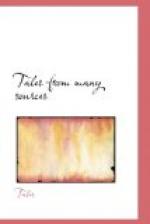Mary Jones was in a dead faint, and, in the absence of all restoratives, seemed likely to remain so.
Mr. Barnes, his head carefully bound up by Betty and her father, was at last able to rise to his feet and take his place in the carriage.
The dawn was already breaking, and a white light stealing over the murky sky, before the mail could once more get under weigh and move heavily forwards.
Far and wide the downs stretched, silent and deserted; a bitter wind swept over them and stirred the mane of the dead horse, who lay a ghastly spectacle, his head thrown back, in a pool of his own blood. From afar, from whence nor eye nor tongue could tell, came a foul raven croaking.
CHAPTER II.
The village of Hendred, of which Mr. Ives was the parson, lay about two miles beyond Wancote, in a low valley nestling under a great wave of the downs. Behind the village a chalk cliff rose white and dazzling, and the warm red brick of the houses, the gleaming chalk, the bright tender green of the herbage, formed one of those sunny pictures of which Berkshire is full.
In the centre of the village rose the little church, with its square grey tower, over which grew a magnificent creeper with crimson leaves glowing with a wondrous richness of colour.
A stone’s throw back from the road, in a high-walled garden, stood the parsonage. The garden was rich with orchard trees and wall fruit, and boasted in particular one golden plum that was the parson’s boast and pride. He had imported rich soil from the valleys, and in each corner of the garden gathered little hills of leaf-mould. Mr. Ives was a notable gardener.
Those who would see Betty Ives at her best should see her at home—at least, so said young Mr. Robins, the rich yeoman’s son, who sighed in vain for her good graces. He was a domestic man, much given to superintending himself, duties which were looked upon as women’s gear—“A womanish man,” said the women.
On the other hand young Thornton, eldest son of Squire Thornton of Thornton Beeches, in the neighbourhood of Wancote, gave out that to see Mistress Betty at her best, was to see her in the hunting-field, for she rode like a bird, and was bright and ready as a pike-staff! There was a confusion of metaphor, but words always failed the young fellow when he spoke of the lady who had already three times refused to be his wife.
Then Dr. Glebe, the good doctor of Wancote, in a grey bag-wig and hunting-boots, would take a whole handful of snuff, while he swore that Mistress Betty was only at her best by a sick-bed.
The parson laughed, and exclaimed with a tear in his eye that such a woman as his daughter was always at her best in whatever she put her hand to do; and the old groom Isaac assented with a chuckle, vowing that his young lady was good all round.
The autumn was beginning, and the crimson creepers on church and wall were at the height of their glow. Betty Ives was strolling in the parsonage garden gathering plums from the wall.




